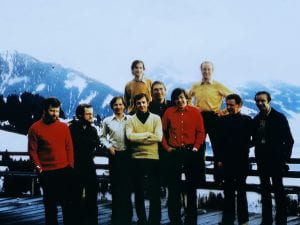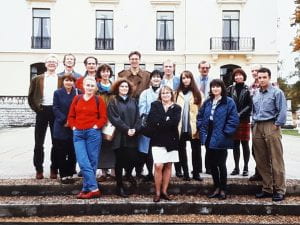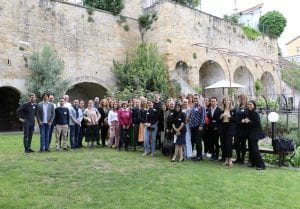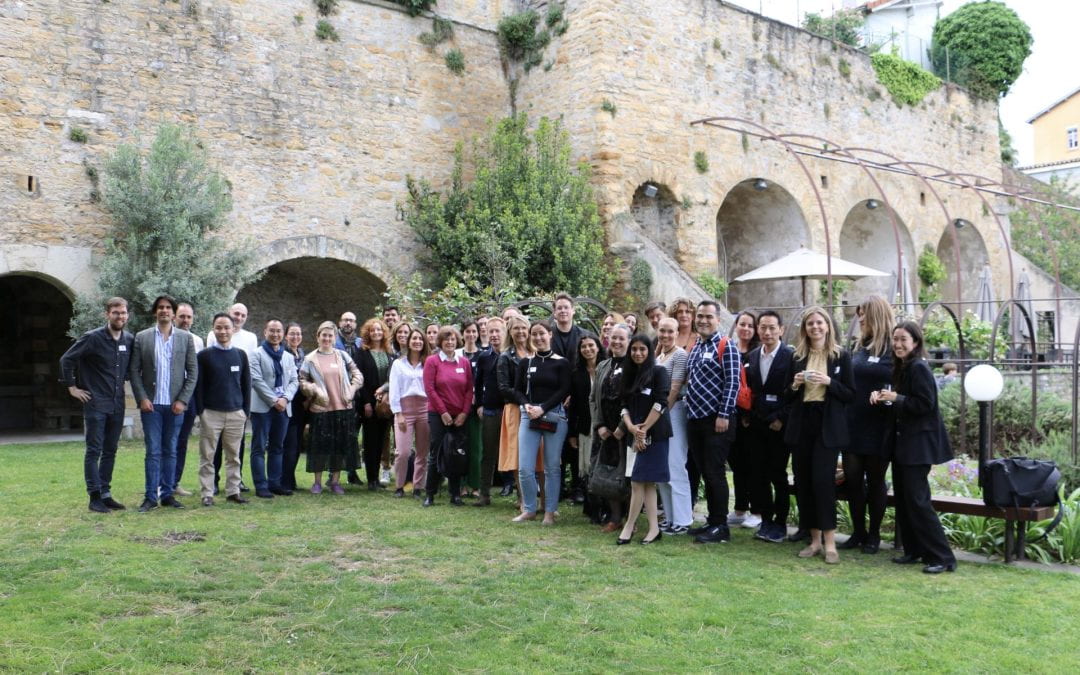In the context of 150-year celebration of emlyon, Lifestyle research center wanted to sketch a short historical background of the key events, people, and influences that helped shape the evolution and activities of the marketing department at our school. With this in mind, we were fortunate to have the chance to interview some of the past marketing department leaders – including, Philippe Albert, Robert Salle, and Gilles Marion. The resulting text was published in the 150-year anniversary book and made available in shortened form below. I want to thank especially Cathy Pardo, Lionel Sitz, Diego Rinallo, and Monica Grosso for the many enriching discussions contributing to the text. Enjoy!
Written by Joonas Rokka, director of Lifestyle research center at emlyon
Marketing Research Excellence
The journey of marketing as an academic discipline and field of research at emlyon began in the 1970s – with a strong local flavor and excellence. As an academic discipline marketing, that derived from applied economics, institutionalized in the US between 1950s and 1960s. The acute relevance of marketing was then driven by the need to better understand the shifting dynamics of consumer/customer behavior, communication, strategy and management of successful marketing offerings. From initial functional and product-oriented focus that dominated until the late 1980s (iconized by Kotler’s 4Ps of product, price, place, promotion), marketing evolved into several differentiated and specialized sub-domains, including services, retail, industrial networks, relationships, advertising, and consumer behavior.
This means that marketing as a field of research today is essentially plural, and consisting of multiple paradigms and traditions. The professional practice of marketing perfectly reflects this and counts a multitude of different jobs spanning sectors as diverse as food, fashion, luxury, sports, hospitality, arts, industrial solutions and beyond. These opportunities make marketing one of the most popular specialization choices and top employers for business school students, around the world.
Marketing is the largest department at emlyon with 34 permanent professors today. Most of them are active in academic research. The following describes the development and “state of the art” of the marketing research, with some of its future directions.
Origins: Industrial marketing influences
Academic research in marketing was not much an emphasis before the increasing internationalization and competition of business schools – influenced by leading American institutions including Harvard, Stanford, and MIT. This brought new requirements coming to the 1980s and 1990s. On the one hand, there was a need to develop more rigorous training of professors (with Phds) as well as for students. On the other hand, the inspiration was to apply scientific research methods to analyze, model and interpret management phenomena. A new emlyon vision was to build research skills and knowledge.
Instilling academic research into the existing structures of emlyon was not easy. For example, in the early 1990s, the marketing department did not have almost any professors with a doctorate or Phd degree. Professors, around 14 of them at the time, were mainly recruited from the industry. The department of marketing was created in the 1970s by professor Philippe Albert, who received his education at HEC and Insead. He was actively involved in creating several research initiatives. One of these was Institut de Recherche de l’Entreprise (IRE): a national research unit pioneering managerial research on French companies and notably industrial suppliers of goods (pharmaceuticals, chemistry, automotive) facing increasingly global competition and complexity in marketing management. IRE was merged with ESC Lyon, bringing many experienced researchers to the school.
Among the participants of this disruptive movement was Robert Salle, now emeritus professor at emlyon. He was one of the founding fathers of IMP Group (Industrial Marketing and Purchasing) in in 1976: a rich research tradition that studies marketing in the context of industrial networks, relationships, and value creation. Several other researchers active in the IRE and IMP joined the school as a result, including long-standing marketing professors Catherine Pardo, François Scheid, and Paul Millier. This had an immediate impact on the character and orientation of the marketing department, headed by Robert Salle in 2008-2012.

IMP conference in 1979.
Highlight events were the organization of the IMP conferences in 1986, 1992 and 1997, gathering hundreds of international marketing scholars in Lyon. This solidified emlyon’s reputation as a forerunner in industrial marketing research and led to numerous influential publications and textbooks – for instance, Michel, Salle and Valla (1996) Marketing Industriel: Strategies et mise en œuvre, Cova and Salle (2003) Le Marketing d’Affaires: Stratégies et methodologies pour vendre des projets ou des solutions, and Pardo (2004) Responsible comptes clés: Comprendre, sélectionner, gérer et developer les grands comptes.

IRE team in 1997.
Foundations: Critical and philosophical influences
While the US-inspired, “mainstream marketing” thought was being adapted in many French and European business schools, the emerging industrial marketing focus and the IMP Group was essentially a “resistant” movement. It argued for new perspectives and methodological approaches, such as the orientation to conduct qualitative, observation-based, interpretive case studies on how industrial marketers, buyers and sellers conduct their work. Close collaboration with companies – and data collection inside them – was at the heart of these efforts, contrasting with dominant survey-based and quantitative research logics at the time. An important focus was then the collaborative writing of “case studies” that were also used actively in teaching.
Another “resistant” and unique feature of our marketing scholarship was commitment to critical, philosophical, and sociological reflections. Gilles Marion, now emeritus professor at emlyon, was hired by Philippe Albert and came to play a key role in shaking the dominant marketing views. Together with influential professors Benoît Heilbrunn, Franc Azimunt, Robert Revat, Philippe Portier among others, he actively engaged in writing books, articles, and organizing colloquiums that stood out in their ethos to profoundly question the very marketing management principles and foundations – for example, how we ought to see consumers, marketing or the society being shaped by the two. It was typical for these scholars to invite guests outside of marketing academia, for example, the famed sociologist Michel Callon or philosopher Michel Serres. Marion and colleagues also published a landmark book that perfectly captured this critical spirit, called “Antimanuel de Marketing” (1990).
Professor Marion, who headed marketing department in two occasions, in 1982-1978 and 2004-2008, initiated emlyon’s second research stream: the study of consumer experiences, practices, resistance, and value co-creation. He also began the hiring of the 2nd generation of marketing scholars now recruited with a doctorate in marketing – a new requirement that was still difficult to meet. Among them was professor Lionel Sitz who was one of the first French Consumer Culture Theory (CCT) scholars, a quickly emerging research group examining consumer culture, identity, communities, and social-cultural issues in marketing. This shift shaped a new phase in the evolution of the department for the coming years.
State-of-the-art: Value creation & lifestyle influences
With the new millennium, the ambition was to increase the quality of research projects, as obliged by international school rankings. This geared attention on the international academic journals such as Journal of Marketing, Journal of Consumer Research, and Journal Marketing Research. The challenge was profound, since there was little prior experience of such highly-demanding research endeavors. Also, the publications of the marketing department were still largely focused on industrial marketing area. Better alignment was needed with newly introduced Master’s programs that emphasized lifestyle expertise – for instance, Luxury Marketing Management, Sports Industry Management, International Hospitability Management (in collaboration with Paul Bocuse Institute), and Digital Marketing & Data Science.
This led to several new international recruits of research-oriented professors, enabled by the natural generational change of the department. Professors Handan Vicdan (Texas Pan-American), Margherita Pagani (Bocconi), Monica Grosso (Bocconi) and Joonas Rokka (Aalto University) brought in new talent. A new Lifestyle Research Center was created in 2016 and sought to foster expertise and knowledge on the important area of lifestyle-related markets, new online media technologies, and contemporary marketing approaches. The team benefitted from exceptional mentorship by visiting professor Eric Arnould (Aalto University), a pioneer in consumer culture research.
The Lifestyle team set out to become an important research group in Consumer Culture Theory (CCT), while also maintaining a strong multi-disciplinary stance. Its research agenda resonates closely with emlyon strategy: 1) the study of consumer and service experience, 2) taste and markets, 3) sustainability, 4) lifestyle branding, and 5) business-to-business marketing. While privileging multiple methods and approaches, the center has a particularly strong expertise of qualitative and interpretive research such as ethnographic, digital and visual research methods. Recently, the research center has welcome a new generation of researchers with skills in quantitative and experimental research methods, whose work offers important insights on consumer lifestyles.
Between 2016-2022, the marketing team has grown significantly in size but also in research activities. Several highly-talented researchers joined in – including professors Anissa Pomiès, Massimo Airoldi, Karine Raïes, Ivan Guitart, Ruiqi Wei, Mia Birau, Christine Lai, Mikko Laamanen, Anil Isisag, Diego Rinallo, Marta Pizzetti, Moritz Joerling, Yingting Wen, and Alisa Minina-Jeunemaître.
The team has organized several international seminars and conferences facilitated reputation further. For example, we hosted the Interpretive Consumer Research (ICR) 2019 conference, sponsored by EIASM (European Institute of Advanced Studies in Management), which is a leading event in our field. We have also organized bi-annual Research Day events that welcome scholars, students, and practitioners to join in – for example, Taste Research Days (2018, 2021), Sustainability Research Day (2018, 2023), and Research Day on Branding (2022).
The research center has also attempted to generate impact in management practice and public policy in new ways. One important long-term collaboration in this respect has been with Club Med, led by Brigitte Auriacombe, which has allowed several members of the Lifestyle research center to carry out multi-sighted ethnographic fieldwork that has shed light on both consumer and worker experiences. More recently, another project on Food Practices in Prisons, led by Anissa Pomiès, and sponsored by the French Ministry of Agriculture and based on both ethnographic and quantitative research methods, aims to provide insight on how to better adapt the food offer to reduce waste in prisons and enhance prisoner satisfaction.
The research center has also entered a new phase of international applied research cooperation in the context of European Union-funded projects. Headed by Diego Rinallo, two projects are looking at sustainable lifestyles, business practices and supporting policy-making in the Alps. Made in the Alps is studying the image of the Alps as a place brand that could facilitate cross-regional institutional and business collaboration based on consumer perceptions with the goal of providing recommendations to EUSALP, the EU strategy for the Alps. AlpTextyles will focus on textile value chains, which need an urgent change being among the most polluting sectors with a massive potential for CO2 reduction. Now that consumers are increasingly critical of products from globalized value chains and increasingly desire living sustainable lifestyles, the project will develop collaborative solutions to accelerate the re-localization of sustainable and circular textile value chains in Alpine countries. Both projects rely on the Lifestyle Research Center expertise on sustainability and branding, combining qualitative and quantitative/experimental research methods to generate actionable insight for businesses and policy makers.

Research Day on Branding seminar in 2022.
Summary: ways forward
The described directions already highlight some prominent future avenues for the marketing research excellence at emlyon. On the one hand, the department’s evolution until today builds on our legacy and expertise in industrial marketing and critical marketing and consumer research traditions. On the other hand, we address important shifts in the contemporary marketing landscape – including increased focus on digital platforms and technology, rapidly changing tastes and lifestyles, as well as demands for marketing practices that are sustainable and socially just. We embrace a strong orientation toward phenomenon-driven theory building (equally in B2b and consumer marketing) and we do not shy away from challenging the dominant ways of seeing and doing marketing.
The following listing is intended to highlight some of the research projects that have been published by the marketing department since early 2000.
Select publications (in order of appearance)
- Ivens, B. S., & Pardo, C. (2007). Are key account relationships different? Empirical results on supplier strategies and customer reactions. Industrial Marketing Management, 36(4), 470-482.
- Woermann, N. and Rokka, J.(2015) Timeflow: How Consumption Practices Shape Consumers’ Temporal Experiences, Journal of Consumer Research, 41 (6), 1486-1508. (Winner of the Sidney J. Levy Award).
- Hong, S. and Vicdan, H.(2016) Re-imagingin the utopian: Transformation of a sustainable lifestyle in ecovillages, Journal of Business Research, 69(1), 120-136.
- Godey, B., Manthiou, A., Pederzoli, D., Rokka, J., Aiello, G., Donvito, R. and Singh, R. (2016) Social media marketing efforts of luxury brands: influence on brand equity and consumer behavior, Journal of Business Research, 69 (12), 5833-5841.
- Pagani, M. and Pardo, C. (2017) The impact of digital technology on relationships in a business network, Industrial Marketing Management, 67, 185-192.
- Weijo, H., Martin, D. and Arnould, E. (2018) Consumer Movements and Collective Creativity: The Case of Restaurant Day, Journal of Consumer Research. ePub available online.
- Grosso, M., Castaldo, S., Li, H., and Lariviére, B. (2020) What Information Do Shoppers Share? The Effect of Personnel-, Retailer-, and Country-Trust on Willingness to Share Information, Journal of Retailing, 96 (4), 524-547.
- Pardo, C., Ivens, B. S., & Pagani, M. (2020). Are products striking back? The rise of smart products in business markets. Industrial Marketing Management, 90, 205-220.
- Pomiès, A., Arsel, Z., & Bean, J. (2020). Consumption Markets & Culture, 1-5. (Special issue: Taste)
- Auriacombe B. and Melkonian T. (2020). Former les managers à l’orientation client : le rôle clé de la prise de perspective,Décisions Marketing, 97-112.
- Harju, L., Rokka, J., Lopes, M., Airoldi, M., and Raïes, K. (2021) EMPLOYEE WELL-BEING PROFILES DURING COVID-19 LOCKDOWN: A Latent Profile Analysis of French and UK Employees, Frontiers in Psychology, 12, 6453000. (Special issue: Happiness at Work Under Crisis Situation)
- Pizzetti, M., Gatti, L. and Seele, P. (2021) Firms Talk, suppliers walk: Analyzing the locus of greenwashing in the blame game and introducing ‘vicarious greenwashing’, Journal of Business Ethics, 170 (1), 21-38.
- Guitart, I. and Stremersch, S. (2021) The impact of informational and emotional television and ad content on online search and sales, Journal of Marketing Research, 58(2), 299-320.
- Ozanne, L.K., Stornelli, J., Luchs, M.G., Mick D.G., Bayuk, J., Birau, M., et al. (2021) Enabling and Cultivating Wiser Consumption: The Roles of Marketing and Public Policy, Journal of Public Policy & Marketing, 40 (2), 226-244.
- Airoldi, M.(2021) The techno-social reproduction of taste boundaries on digital platforms: The case of music on YouTube, Poetics, 89, 101563.
- Juge, E., Pomiés, A., and Collin-Lachaud, I. (2021) Plateformes digitales et concurrence par la rapidité. Le cas des vêtements d’occasion, Recherche et Applications en Marketing, ePub ahead of print.
- Bowen, Melanie, Christine Lai-Bennejean, Alexander Haas, and Deva Rangarajan (2021) Social media in B2B sales: Why and when does salesperson social media usage affect salesperson performance?Industrial Marketing Management, 96, 166-82.
- Thompson, C.J. and Isisag, A. (2021) Beyond existential and neoliberal explanations of consumers’ embodied risk-taking: CrossFit as an articulation of reflexive modernization, Journal of Consumer Culture, ePub ahead of print.
- Wei, R., Geiger, S. and Vize, R. (2022) Managing paradoxical tensions in platform-based modular solution networks, Industrial Marketing Management, 100, 96-111.
- Lupu, I., and Rokka, J. (2022) ‘Feeling in Control’: Optimal Busyness and the Temporality of Controls, Organization Science, 33 (4), 1396-1422.
- Pomiés, A. and Arsel, Z. (2022) Market Work and the Formation of the Omnivorous Consumer Subject, Journal of Consumer Research, ePub ahead of print.


Commentaires récents